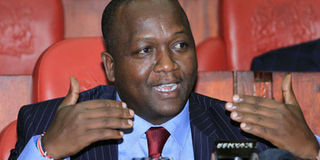Debate to change Constitution evokes memories of 1970s

Tiaty MP William Kamket defends his bill on changes to the governance system, before the National Assembly's Budget and Appropriations Committee on March 1, 2018 at Parliament Buildings. PHOTO | JEFF ANGOTE | NATION MEDIA GROUP
What you need to know:
The main proponents of the then anti-Moi campaign were a clique of Gema politicians led by the late Njenga Karume and Kihika Kimani.
This Nakuru meeting caused a stir all over the country and spread alarm among Moi’s supporters.
Moi eventually succeeded Mzee Kenyatta following his demise on August 22, 1978.
The debate to change the 2010 Constitution ahead of the 2022 General Election evokes memories of the clamour in the mid 1970s to change the law in order to block then Vice President Daniel Moi from succeeding Mzee Jomo Kenyatta.
The main proponents of the then anti-Moi campaign were a clique of Gema politicians led by the late Njenga Karume and Kihika Kimani.
They wanted the supreme document amended so that either the Head of the Civil Service, the Speaker of the National Assembly and the Chief Justice would assume the Presidency in the event of Mzee Kenyatta’s death, albeit on a temporary, 90-day basis.
In his autobiography “Beyond Expectations: From Charcoal to Gold” Mr Karume detailed how the idea of change the Constitution movement was conceived on a flight to Europe between him and Mr Kimani.
Kimani had no idea that the law was on Moi’s side in the event Mzee Kenyatta died and they immediately hatched a plan to change it.
FIRST MEETING
Here is an excerpt: “The first meeting of the “Change the Constitution Movement” was held in Nakuru in 1976. Thousands of Kenyans attended and leaders from various tribes addressed the crowd.
They spoke unflatteringly of Moi’s style of leadership and told the people that the person who would take over from Kenyatta should be a strong character who could steer the country forward. They depicted Moi as the antithesis of this person and urged wananchi to support their goal of changing the Constitution.
“Let me tell you people,” Paul Ngei, then Minister for Cooperatives and Housing, told the crowds in Afraha Stadium, “If my wife, Emma, and I were to go to State House and I was in the acting capacity of President for three months, I would never get out for any other person to occupy the seat. Not even the strongest animal in the world would pull me out of there.”
This Nakuru meeting caused a stir all over the country and spread alarm among Moi’s supporters.
TACTICS
Moi’s camp was not surprised by the tactics of the “Change the Constitution Movement” but they were appalled and shocked by the enormous support from the leaders of other tribes.
“After considerable deliberation, (then Attorney General Charles) Njonjo came up with a fairly simple, yet totally devastating solution which surprised the rest of us. He announced that all those who addressed the Nakuru rally would be arrested and charged with treason. The Penal Code had an interesting little section which stated that it was an offence for anyone to imagine the death of the sitting President.”
In an earlier interview, former State House Comptroller Matere Keriri said that Kikuyu leaders met again in 1977 at Nyahururu. Top of the agenda was how to block Moi from ascending to the presidency, Mr Keriri recalls it was then Minister for Finance Mwai Kibaki who told off the leaders over their anti-Moi campaign.
Moi eventually succeeded Mzee Kenyatta following his demise on August 22, 1978.
PRESSURE
This time round, the push for changes to the Constitution is being spearheaded by Tiaty MP William Kamket, an ally of Mzee Moi’s son and Baringo Senator Gideon.
It is a debate that has put politicians from central Kenya under immense pressure to endorse it publicly as it portrays them as a selfish community intent on short-changing Deputy President William Ruto.
Mr Kamket’s bill seeks the re-introduction of the post of Prime Minister as an elected member of the National Assembly. It also calls for the scrapping of the Office of the Deputy President.
And for one to be elected president, one will have to be aged 50 and above. The president will serve a single term of seven years and will be elected by a joint sitting of the Senate and the National Assembly.




